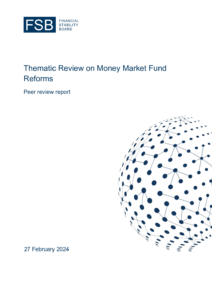Press enquiries:
+41 61 280 8477
[email protected]
Ref: 5/2024
-
Peer review finds uneven progress in implementing the 2021 FSB policy proposals for money market funds (MMFs) and calls on member jurisdictions to review policy frameworks and adopt tools to address MMF vulnerabilities.
-
FSB also calls on IOSCO to consider the findings of the peer review when it revisits its 2012 Policy Recommendations for MMFs.
The Financial Stability Board (FSB) today published its Thematic Review on Money Market Fund (MMF) Reforms. The review takes stock of the measures adopted or planned by FSB member jurisdictions in response to the 2021 FSB report, Policy Proposals to Enhance MMF Resilience. The review does not assess the effectiveness of those policy measures in addressing risks to financial stability, as this will be the focus of separate follow-up work by the FSB in 2026.
The main MMF vulnerability identified by jurisdictions is the mismatch between the liquidity of fund asset holdings and the redemption terms offered to investors, which makes MMFs susceptible to runs from sudden and disruptive redemptions. To address vulnerabilities, the 2021 FSB report provided a menu of policy options including: imposing on redeeming investors the cost of their redemptions; enhancing the ability to absorb credit losses; addressing regulatory thresholds that may give rise to cliff effects; and reducing liquidity transformation.
The review finds that progress in implementing the 2021 FSB policy proposals has been uneven across FSB member jurisdictions. Authorities in all jurisdictions reported that they had implemented policies aimed at addressing MMF vulnerabilities prior to the 2021 FSB Report. Since then, some jurisdictions have introduced new policy tools or recalibrated existing ones (China, India, Indonesia, Japan, Korea, Switzerland, US), while others are still in the process of developing or finalising their reforms (EU, South Africa, UK). The review concludes that, given the vulnerabilities reported in individual jurisdictions, further progress on implementing the FSB policy toolkit would be needed to enhance MMF resilience and limit the need for extraordinary central bank interventions during times of stress.
The review calls on FSB member jurisdictions that have not yet done so to review their policy frameworks and adopt tools to address identified MMF vulnerabilities, taking into consideration the 2021 FSB policy proposals. Where relevant tools, such as minimum liquidity requirements, are already available, the review recommends that FSB jurisdictions consider whether these need to be re-calibrated to ensure their effective use and to maintain a sufficient level of MMF resilience. It also recommends that IOSCO consider the findings of this review when it revisits its 2012 Policy Recommendations for MMFs in light of the 2021 FSB Report. The FSB will take these findings into account in its monitoring of the vulnerabilities and policy tools for MMFs.
Ryozo Himino, Chair of the FSB’s Standing Committee on Standards Implementation (SCSI) that oversaw the preparation of the peer review said, “This report summarises the progress made to date by FSB member jurisdictions in implementing the 2021 FSB policy proposals to address MMF vulnerabilities, identifies remaining areas for further work, and lays the ground for the assessment of the reforms’ effectiveness that the FSB plans to conduct in 2026.”
Notes to editors
The FSB began a regular programme of peer reviews in 2010, consisting of thematic reviews and country reviews. Thematic reviews focus on the implementation and effectiveness across the FSB membership of international financial standards developed by standard-setting bodies and policies agreed within the FSB in a particular area important for global financial stability. Thematic reviews may also analyse other areas important for global financial stability where international standards or policies do not yet exist. Peer reviews are conducted according to the objectives and guidelines set out in the Handbook for FSB Peer Reviews.
Addressing vulnerabilities in MMFs is a key element of the FSB’s work programme to enhance the resilience of non-bank financial intermediation. This report describes the findings of the thematic peer review on MMF reforms, including key elements of the discussion in the FSB Standing Committee on Standards Implementation. The draft report was prepared by a team of experts drawn from FSB member and other authorities and led by Yuji Yamashita (Japan Financial Services Agency).
The FSB coordinates at the international level the work of national financial authorities and international standard-setting bodies and develops and promotes the implementation of effective regulatory, supervisory, and other financial sector policies in the interest of financial stability. It brings together national authorities responsible for financial stability in 24 countries and jurisdictions, international financial institutions, sector-specific international groupings of regulators and supervisors, and committees of central bank experts. The FSB also conducts outreach with approximately 70 other jurisdictions through its six Regional Consultative Groups.
The FSB is chaired by Klaas Knot, President of De Nederlandsche Bank. The FSB Secretariat is located in Basel, Switzerland and hosted by the Bank for International Settlements.
